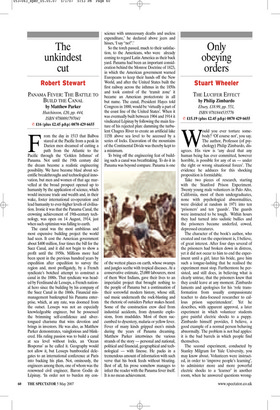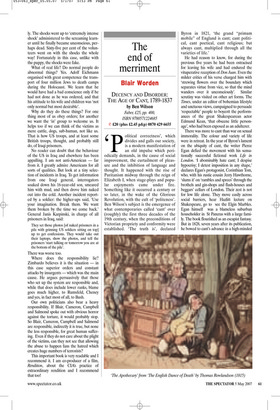Only obeying orders
Stuart Wheeler
THE LUCIFER EFFECT by Philip Zimbardo
Ebury, £18.99, pp. 551, ISBN 9781844535776
✆ £15.19 (plus £2.45 p&p) 0870 429 6655 Would you ever torture somebody? ‘Of course not’, you say. The author, Professor (of psychology) Philip Zimbardo, disagrees. His view is ‘any deed that any human being has ever committed, however horrible, is possible for any of us — under the right or wrong situational forces’. The evidence he adduces for this shocking proposition is formidable.
Take two pieces of research, starting with the Stanford Prison Experiment. Twenty young male volunteers in Palo Alto, California, most of them undergraduates, none with psychological abnormalities, were divided at random in 1971 into ten ‘prisoners’ and ten ‘guards’. The guards were instructed to be tough. Within hours they had turned into sadistic bullies and the prisoners became underfed, cowed, depressed creatures.
The character of the book’s author, who created and ran the experiment is, I believe, of great interest. After four days several of the prisoners had broken down in distress, yet it did not occur to him to end the experiment until a girl, later his bride, gave him such a tongue-lashing that he realised the experiment must stop. Furthermore he persisted, and still does, in believing what is clearly untrue, that the prisoners knew that they could leave at any moment. Zimbardo laments and apologises for his ‘role transformation from usually compassionate teacher to data-focused researcher to callous prison superintendent’. Yet he describes, with apparent approval, a later experiment in which volunteer students gave painful electric shocks to a puppy. Zimbardo himself provides, I believe, a good example of a normal person behaving abnormally. The problem is not bad apples: it is the bad barrels in which people find themselves.
The second experiment, conducted by Stanley Milgram for Yale University, you may know about. Volunteers were instructed, in order to ‘improve people’s learning’, to administer more and more powerful electric shocks to a ‘learner’ in another room, when he answered questions wrong ly. The shocks went up to ‘extremely intense shock’ administered to the screaming learner until he finally became unconscious, perhaps dead. Sixty-five per cent of the volunteers went on with the shocks the whole way! Fortunately in this case, unlike with the puppy, the shocks were fake.
What of real life? Do normal people do abnormal things? Yes. Adolf Eichmann organised with great competence the transport of four million Jews to death camps during the Holocaust. We learn that he would have had a bad conscience only if he had not done as he was ordered, and that his attitude to his wife and children was ‘not only normal but most desirable’.
Why do they do these things? For one thing most of us obey orders; for another we want the ‘in’ group to welcome us. It helps too if we can think of the victims as mere cattle, dogs, sub-human, not like us. That is how US troops, and at least some British troops, thought, and probably still do, of Iraqi prisoners.
No reader can doubt that the behaviour of the US in Iraq and elsewhere has been appalling. I am not anti-American — far from it. I greatly admire Americans for all sorts of qualities. But look at a tiny selection of incidents in Iraq. To get information from one Iraqi general, interrogators soaked down his 16-year-old son, smeared him with mud, and then drove him naked out into the cold. Another incident reported by a soldier: the higher-ups said, ‘Use your imagination. Break them. We want them broken by the time we come back.’ General Janis Karpinski, in charge of all prisoners in Iraq, said:
They set those photos [of naked prisoners in a pile with grinning US soldiers sitting on top] up to get confessions. They would take out their laptops, show the photos, and tell the prisoners ‘start talking or tomorrow you are at the bottom of the pile’.
There was worse too.
Where does the responsibility lie? Zimbardo believes it is the situation — in this case superior orders and constant attacks by insurgents — which was the main cause. He argues persuasively that those who set up the system are responsible and, while that does include lower ranks, blame goes much higher, to Rumsfeld, Cheney and yes, in fact most of all, to Bush.
Our own politicians also bear a heavy responsibility. If Blair, Cameron, Campbell and Salmond spoke out with obvious horror against the torture, it would probably stop. So Blair, Cameron, Campbell and Salmond are responsible, indirectly it is true, but none the less responsible, for great human suffering. Even if they do not care about the plight of the victims, can they not see that allowing the abuse to happen fans the hatred which creates huge numbers of terrorists?
This important book is very readable and I recommend it. I am co-producer of a film, Rendition, about the CIA’s practice of extraordinary rendition and I recommend that too!



































































































 Previous page
Previous page